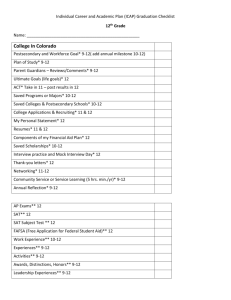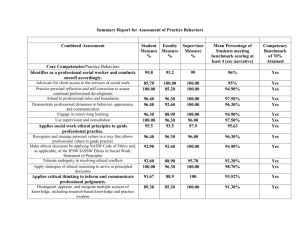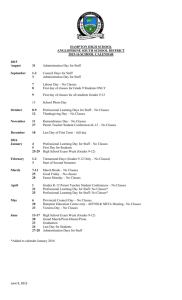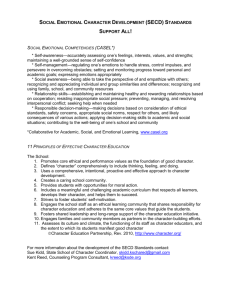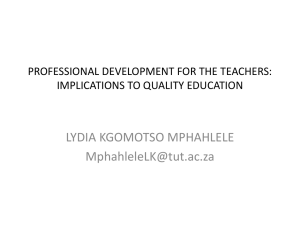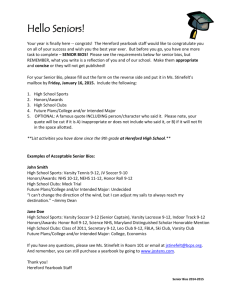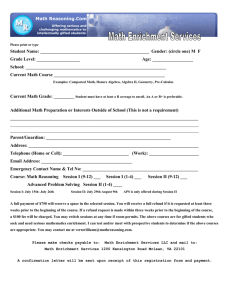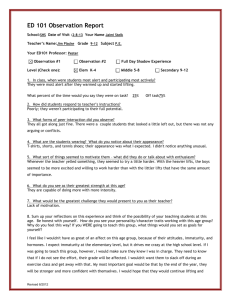Functional Learning Skills
advertisement
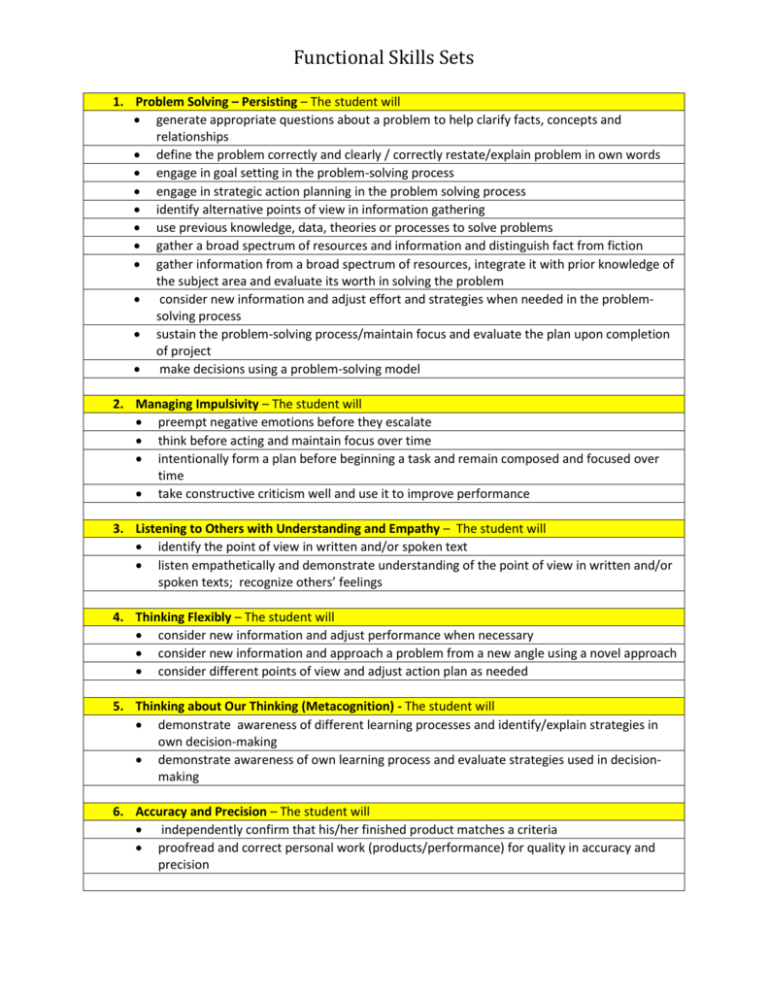
Functional Skills Sets 1. Problem Solving – Persisting – The student will generate appropriate questions about a problem to help clarify facts, concepts and relationships define the problem correctly and clearly / correctly restate/explain problem in own words engage in goal setting in the problem-solving process engage in strategic action planning in the problem solving process identify alternative points of view in information gathering use previous knowledge, data, theories or processes to solve problems gather a broad spectrum of resources and information and distinguish fact from fiction gather information from a broad spectrum of resources, integrate it with prior knowledge of the subject area and evaluate its worth in solving the problem consider new information and adjust effort and strategies when needed in the problemsolving process sustain the problem-solving process/maintain focus and evaluate the plan upon completion of project make decisions using a problem-solving model 2. Managing Impulsivity – The student will preempt negative emotions before they escalate think before acting and maintain focus over time intentionally form a plan before beginning a task and remain composed and focused over time take constructive criticism well and use it to improve performance 3. Listening to Others with Understanding and Empathy – The student will identify the point of view in written and/or spoken text listen empathetically and demonstrate understanding of the point of view in written and/or spoken texts; recognize others’ feelings 4. Thinking Flexibly – The student will consider new information and adjust performance when necessary consider new information and approach a problem from a new angle using a novel approach consider different points of view and adjust action plan as needed 5. Thinking about Our Thinking (Metacognition) - The student will demonstrate awareness of different learning processes and identify/explain strategies in own decision-making demonstrate awareness of own learning process and evaluate strategies used in decisionmaking 6. Accuracy and Precision – The student will independently confirm that his/her finished product matches a criteria proofread and correct personal work (products/performance) for quality in accuracy and precision Functional Skills Sets 7. Effective Communication – The student will communicate accurately, clearly and precisely in oral communication communicate accurately, clearly and effectively in written communication generate appropriate visual aids that facilitate understanding 8. Critical Thinking – Reasoning – The student will accurately define parts of a system and explain how those parts interact with one another accurately define parts of a system, explain how those parts interact with one another and interpret relationships between systems demonstrate complexity in thinking by supporting and justifying statements consider past knowledge of the relevant content and make connections/ see relationships with new information use comparison and contrast to help understand information use methods of prioritization to rationally narrow focus and/or weigh factors to determine relative value of choices or alternatives demonstrate logical reasoning to solve problems provide proof/justification of a conclusion 9. Thinking Interdependently - Collaborating – The student will work cooperatively and accomplish tasks in small groups engage in collaborative work assuming different roles and responsibilities to accomplish tasks effectively in small groups be aware of own actions and the effect on others and on the environment engage in collaborative work effectively using group dynamic skills and successfully moving the group toward the goal 10. Creating – The student will generate more than one idea (fluency) notice what is unusual, surprising and/or interesting in concrete (everyday objects) and abstract environments (flexibility) independently and reasonably evaluate ideas and decide which are worth pursuing (evaluation) generate novel or original ideas without worrying about failure (appropriate risk taking) add details to ideas or designs as needed for implementation and improvement (elaboration) strive for greater fluency, flexibility, originality, elaboration and evaluation to refine work 11. Research – The student will create and apply a framework for the project and revise as necessary plan, prioritize tasks, and complete activities within timeline of a project gather a broad spectrum of resources and information and integrate it with prior knowledge to successfully complete a research project plan, develop and complete a research project and present results/conclusions clearly and concisely Functional Skills Sets 12. Ethical Behavior – The student will use classroom project time well, conversing primarily on the project and in a manner that does not disrupt others obtain information from appropriate sources with accurate citations for all borrowed material 13. Civic Responsibility – The student will show regard for peers and adults by keeping work, play and public areas clean and organized show regard for peers and adults by involvement in service projects in the home, school and/or community 14. Accepts/Seeks Challenges – Lifelong Learning – The student will challenge self to meet goals that others think are too difficult and be open to new academic learning experiences invite opportunities for valuable academic learning experiences, even if extra effort is required, and search for new and better ways of learning and improvement 15. Finding Humor – The student will find incongruity and perceive absurdities, ironies and satire find humor in the appropriate situations and is able to laugh at self 21st Century Learning Skills – CSOs (21C.O.LS1-2-3) By Grade Levels Continued below. Functional Skills Sets Standard Objective Information Access and and analyze Communication Information Skills Grade Level PK - 2 3-4 5-8 9-12 Create PK - 2 3-4 5-8 Learning Skills Uses text, people and electronic resources (e.g. interactive books, educational software, CD-ROMs, elementary multimedia encyclopedias and search engines) to locate information for an assignment and is able to identify the author and purpose for each source located. Identifies information needed to solve a problem or complete an assignment, conducts a search and prioritizes various sources based on credibility and relevance, retrieves relevant information from a variety of media sources, and…(see Create) When presented with a problem, identifies the information needed, uses text, people, online databases and search engines to filter relevant information efficiently, analyzes information for biases, synthesizes information gathered and creates an effective and efficient response to the problem. Recognizes information needed for problem solving, can efficiently browse, search and navigate online to access relevant information, evaluates information based on credibility, social, economic, political and/or ethical issues, and presents findings clearly and persuasively using a range of technology tools and media. Can accurately interpret and create simple visuals (i.e. charts, maps, graphs and models) and use this information to solve problems and communicate information. …uses this information to create an effective presentation. Accurately interprets symbols and visuals and can distinguish fact from opinion when presented with visuals through various media; uses his/her knowledge to construct new knowledge and communicate information Interprets abstract visuals and creates products (e.g. digital storytelling) that reflect a growing understanding of visual Functional Skills Sets 9-12 Communicate PK - 2 3-4 5-8 9-12 Thinking and Reasoning Critical thinking PK - 2 3-4 5-8 9-12 Understanding Systems PK - 2 language and require the effective use of tools (e.g. cropped photos, original charts and graphs, well-chosen images from databases, video clips). Analyzes and interprets visuals and recognizes the impact digital media influences (e.g. design, technique, and rate of speed) have on audiences. Visual products reflect a sophisticated understanding of subject, digital media and design techniques. Articulates thoughts and ideas, representative of real and imaginary experiences, clearly and effectively through oral, written or multimedia communication. Is cognizant of audience and purpose, articulates thoughts and ideas accurately and effectively through oral, written or multimedia communications. Presents thoughts, ideas, and conceptual understanding efficiently, accurately and in a compelling manner and enhances the oral or written presentation through the use of technology. Creates information using advanced skills of analysis, synthesis and evaluation and shares this information through a variety of oral, written and multimedia communications that target academic, professional and technical audiences and purposes. Engages with teacher assistance in a critical thinking process by conducting basic evaluations using simple criteria. Engages, with teacher assistance, in a critical thinking process that synthesizes knowledge and ideas. Engages in a critical thinking process that supports synthesis and conducts evaluations by applying comprehensive criteria. Engages in a critical thinking process that supports synthesis and conducts evaluation using complex criteria. Identifies parts of a system and explains how those parts interact with one another. Functional Skills Sets 3-4 5-8 9-12 Problem Solving PK - 2 3-4 5-8 9-12 Synthesis fluency PK - 2 3-4 5-8 9-12 Identifies parts of a system and explains how those parts interact with one another. Draws conclusions from a variety of data sources to analyze and interpret systems. Draws conclusions from a variety of data sources to analyze and interpret systems. Engages in a problem solving process using objects to solve problems and demonstrates learning by explaining how they solved the problem. Engages in a problem solving process that promotes questioning, planning investigations and finding answers and solutions. Engages in a problem solving process that divides complex problems into simple parts in order to devise solutions. Engages in a problem solving process by formulating questions and applying complex strategies in order to independently solve problems. Engages in discovery, exploration and experimentation to reach unexpected answers. Makes unusual associations and provides a variety of solutions to problems. Generates ideas for solutions to problems and asks questions in order to create unusual, unique or clever products. Student begins to cognitively recognize the skills of adapting, improving, modifying and expanding existing thoughts or ideas to create products. Creates thoughtful ideas and solutions and takes risks as he/she works toward goals despite mistakes. Begins to consistently think of all the possibilities and diverges to become more expansive with his/her thoughts/ideas that lead to the creation of original products. Visualizes the connection between seemingly unrelated ideas and independently produces solutions that are fresh, unique, original and well developed. Shows capacity for originality, concentration, commitment to completion, and persistence to develop unique and cogent products. Functional Skills Sets Personal and Workplace Skills Intrapersonal skills PK - 2 3-4 5-8 9-12 Flexible thinking PK - 2 3-4 5-8 9-12 Self Assessment PK - 2 3-4 5-8 Manages negative emotions, aligns his/her goals to the goals of others and works cooperatively and productively with others in small groups. Manages and preempts negative emotions before they escalate, exercises selfrestraint without assistance and works productively in a variety of group settings. Manages emotions and behaviors, engages in collaborative work assignments requiring compromise… Remains composed and focused, even under stress, willingly aligns his/her personal goals to the goals of others when appropriate, approaches conflict from winwin perspective and derives personal satisfaction from achieving group goals. …abandons ineffective strategies when introduced to more effective strategies for solving a problem or completing a task. …and with minimal assistance, considers alternative methods, solutions and perspectives to solving a problem or completing a task. Is flexible in approach to solving problems and completing tasks, considers alternative methods, solutions and perspectives, abandons strategies that do not work and reallocates time and resources as priorities change. Independently considers multiple perspectives and can represent a problem in more than one way, quickly and calmly changes focus and goals as the situation requires, and actively seeks innovations (e.g. technology) that will enhance his/her work. Understands the defined learning goal and uses age-appropriate instructional rubrics and tools to assess his/her performance in meeting the goal within the timeline established by the teacher. …while using instructional rubrics and other tools to monitor and evaluate his/her performance. Sets challenging goals and strategically plans to reach those goals, monitors Functional Skills Sets 9-12 Ethical behavior PK - 2 Responsibility 3-4 5-8 9-12 Interpersonal skills PK - 2 Leadership 3-4 5-8 performance and adjusts effort and strategies, seeks assistance when needed, and demonstrates focused commitment to reaching the established goals. Demonstrates ownership of his/her learning by setting goals, monitoring and adjusting performance, extending learning, using what he/she has learned to adapt to new situations, and displaying perseverance and commitment to continued learning. Knows the difference between right and wrong, is accepting of others in work and play groups, and shows regard for peers and adults within the school by keeping work, play and public areas clan and organized. Appreciates, accepts and works cooperatively with others, in both academic and social contexts, shares responsibility for continued improvement of the academic performance and climate of the school, and exhibits ethical behavior while working alone or communicating with others. Demonstrates ethical behavior and works responsibly and collaboratively with others, in academic and social contexts, … Demonstrates ethical behavior and works responsibly and collaboratively with others in the context of the school and the larger community, and he/she demonstrates civic responsibility through engagement in public discourse and participation in service learning. Demonstrates ability to assume different roles and responsibilities as assigned by the teacher. Uses clearly defined teacher directions and interpersonal skills to move others toward the goal. Is flexible in assuming various roles and responsibilities in the classroom and the school,… Uses his/her interpersonal skills when in an assigned leadership role, … …and demonstrates flexibility by assuming Functional Skills Sets 9-12 Plan and Execute Tasks PK - 2 3-4 5-8 9-12 different roles and responsibilities within various team structures. Exhibits positive leadership through interpersonal and problem-solving skills that contribute to achieving the goal. He/she helps others stay focused, distributes tasks and responsibilities effective, and monitors group progress toward the goal without undermining the efforts of others. Focuses on a project goal, and with teacher guidance, frames appropriate questions related to the goal, considers possible courses of action, selects a plan of action and completes the project. …helps others stay focused and successfully moves the group toward the goal. … to accomplish both individual and team goals related to improved academic, extracurricular and co-curricular performances. Maintains a strong focus on the larger project goal and frames appropriate questions and planning processes around the goal. Prior to beginning work, reflects upon possible courses of action and their likely consequences; sets objectives related to the larger goal; and establishes benchmarks for monitoring progress. While working on the project, adjusts time and resources to allow for completion of a quality product.
